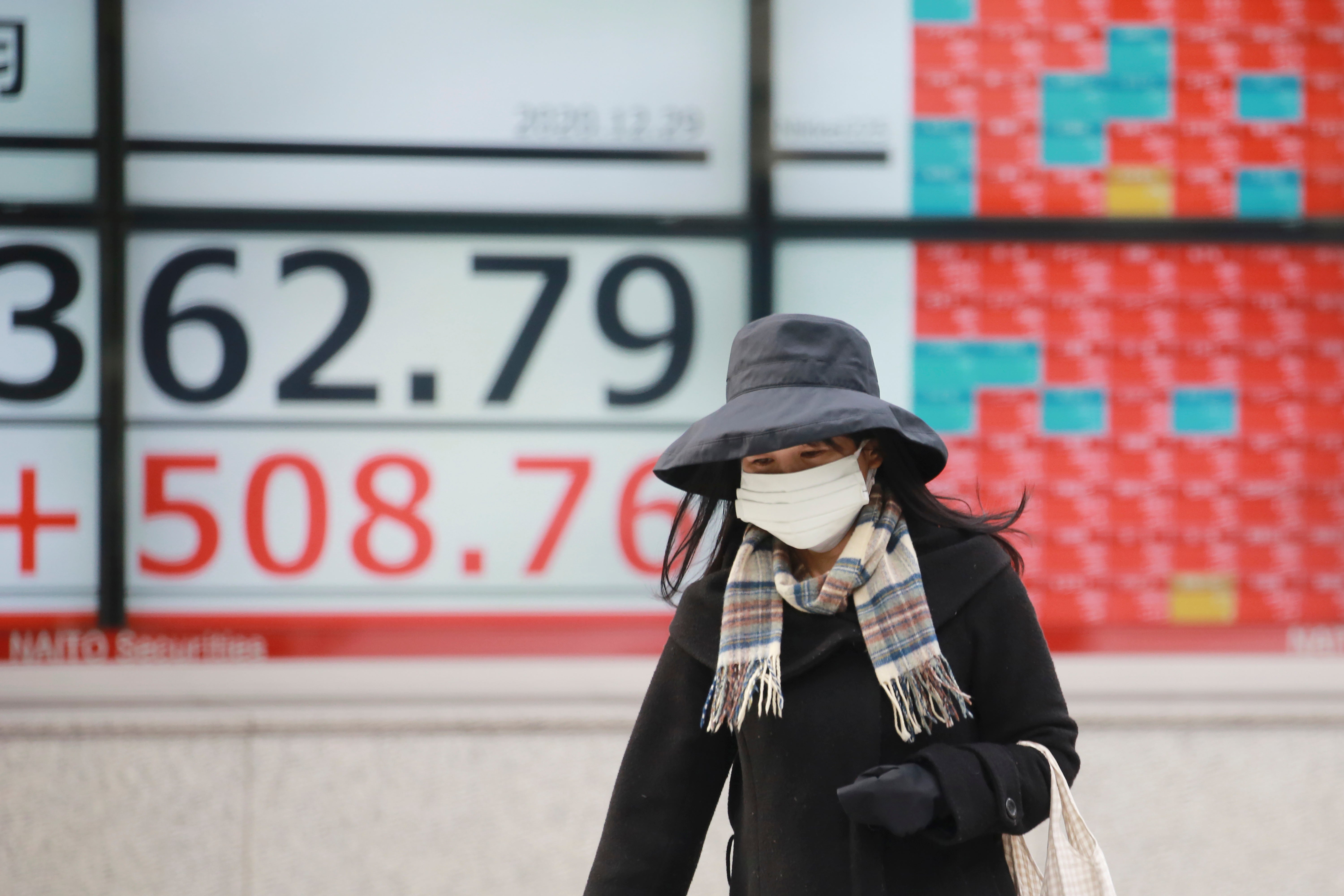Japan's Nikkei at 30-year high after Trump OKs stimulus
Stocks have climbed in Asia, with Japan's Nikkei 225 index surging 2.7% to its highest close in more than 30 years on Tuesday

Your support helps us to tell the story
From reproductive rights to climate change to Big Tech, The Independent is on the ground when the story is developing. Whether it's investigating the financials of Elon Musk's pro-Trump PAC or producing our latest documentary, 'The A Word', which shines a light on the American women fighting for reproductive rights, we know how important it is to parse out the facts from the messaging.
At such a critical moment in US history, we need reporters on the ground. Your donation allows us to keep sending journalists to speak to both sides of the story.
The Independent is trusted by Americans across the entire political spectrum. And unlike many other quality news outlets, we choose not to lock Americans out of our reporting and analysis with paywalls. We believe quality journalism should be available to everyone, paid for by those who can afford it.
Your support makes all the difference.Stocks rose Tuesday in Asia, with Japan’s Nikkei 225 index hitting a 30-year high after President Donald Trump signed a $900 billion economic aid package.
Wall Street set fresh records on Monday after Trump opted not to veto the bill, helping to staunch uncertainty as governments reimpose pandemic-fighting travel and business curbs weighing on global economic activity.
In Tokyo, the Nikkei 225 jumped 2.7% to 27,568.15, the first time it has traded above 27,000 since August 1990, according to FactSet. The market hit its all-time peak close of 38,915.87 on Dec. 29, 1989.
The benchmark was buoyed by strong gains in heavyweights like Mitsubishi Heavy Industries, which surged 4.6%, apparel maker Fast Retailing, also up 4.6%, and technology and energy company SoftBank, which gained 4.2%.
Other Asian shares were also mostly higher.
Hong Kong's Hang Seng index rose 0.9% to 26,557.18. In South Korea, the Kospi edged 0.1% higher to 2,814.16. Australia's S&P/ASX 200 climbed 0.5% to 6,700.30.
The Shanghai Composite index fell 0.3% to 3,386.57. Shares fell in Taiwan and Indonesia but rose in Malaysia and Singapore.
Trading is thinning as tumultuous 2020 draws to a close. But after nosediving in March as the pandemic took hold, share prices have more than recovered, helped by massive infusions of central bank cash and ultra-low interest rates, which make shares potentially more lucrative than other investments.
Investors have gained confidence with the rollouts of coronavirus vaccinations they hope will pave the way for a return to normal activity in coming months.
On Monday, the S&P 500 climbed 0.9% to 3,735.36, powered by gains in technology, communication services and consumer discretionary stocks. Companies that were hit the hardest by the pandemic, including restaurants, airlines and cruise operators, were among the biggest gainers.
The broad rally came as investors welcomed the decision by President Donald Trump to sign a $900 billion coronavirus economic aid package despite his complaints that $600 payments for most individuals were too low. The package also includes $1.4 trillion to fund government agencies, averting a federal government shutdown that otherwise would have started Tuesday.
The Dow Jones Industrial Average gained 204.10 points, or 0.7%, to 30,403.97, a record high. The Nasdaq composite climbed 94.69 points, or 0.7%, to 12,899.42, also a record high. The Russell 2000 index of smaller companies fell 7.70 points, or 0.4%, to 1,996.25.
Wall Street had been hoping since last week that Trump would back down from his threat to veto the economic legislation, clearing the way for more financial support for hurting individuals and businesses.
The U.S. economy continues to deteriorate under widespread coronavirus outbreaks, infections and hospitalizations, so the promise of more relief for millions of Americans helps reduce uncertainty amid the re-imposition of travel and business curbs in response to a new coronavirus variant that is thought to be more contagious.
“By and large, it’s a kind of broad-based optimism, so-far-so-good on the vaccine rollout, and the stimulus bill to bridge the gap,” said Ross Mayfield, investment strategist at Baird, “It’s really just a continuation of the broader strength that we’ve seen over the last couple of months.”
Stocks also got a seasonal boost, Mayfield said. The market tends to climb in the final trading days in December and the first two trading days in January, a phenomenon known as the “Santa Claus rally.” Since 1950, the S&P 500 index has risen an average of 1.3% during those seven days.
Treasury yields were mixed. The 10-year Treasury yield, which can affect interest rates on mortgages and other consumer loans, rose to 0.94% from 0.92% late Monday.
Trading is expected to be light this week, as most fund managers and investors have closed their books for the year. It will be another holiday-shortened week, with New Year's Day on Friday.
In other trading, benchmark U.S. crude oil gained 31 cents to $47.93 per barrel in electronic trading on the New York Mercantile Exchange. It lost 61 cents to $47.62 per barrel on Monday. Brent crude, the international standard, picked up 29 cents to $51.19 per barrel.
The dollar was trading at 103.69 Japanese yen, down from 103.81 yen late Monday. The euro rose to $1.2236 from $1.2214.
___
AP Business Writer Alex Veiga contributed.